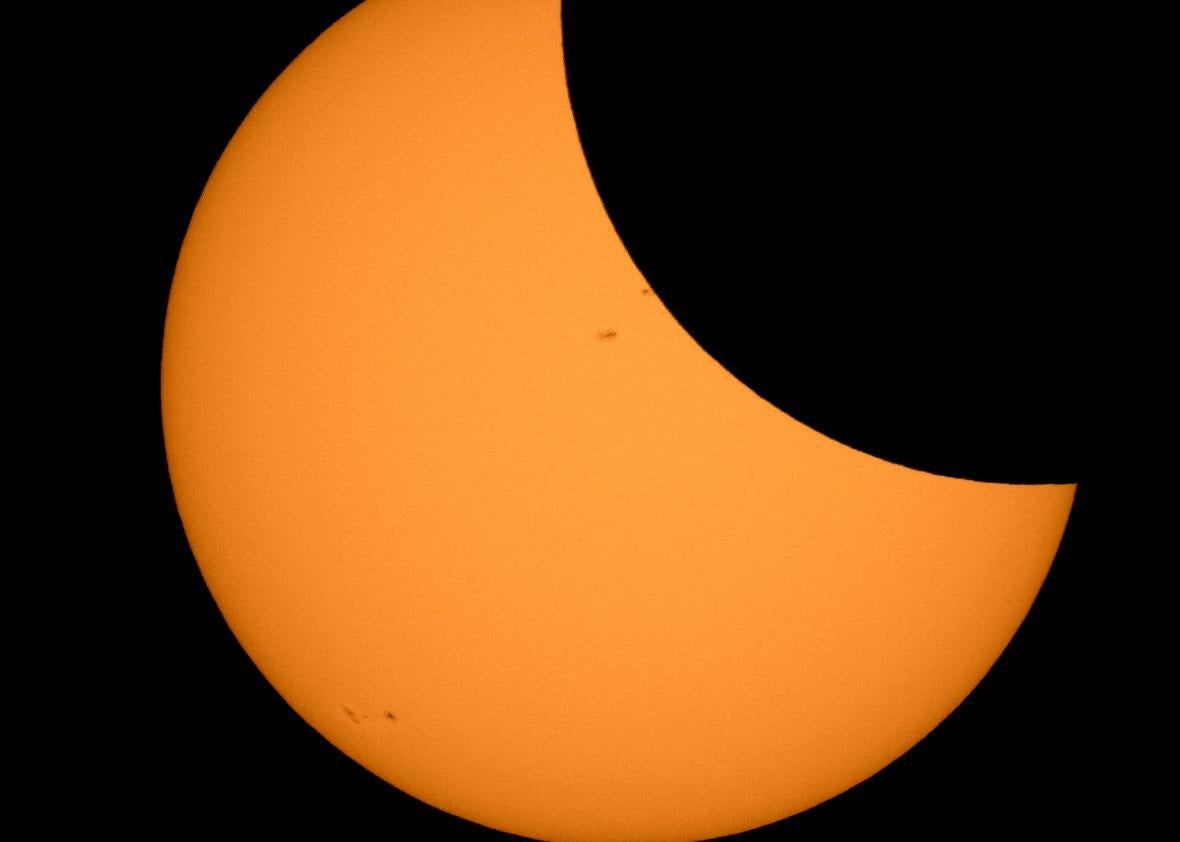This article originally ran ahead of the 2017 eclipse. The same rules apply.
The one thing everyone knows about silica gel is that you can’t eat it, and the one thing everyone knows about the solar eclipse is that you can’t look at it—at least, not without special solar eclipse glasses. But eating just a little bit of silica gel probably won’t really hurt you. So can you maybe get away with just a little bit of looking at the eclipse? Like, what about just a peek?
The answer seems to be: Yes, you can probably peek at the eclipse without permanently damaging your vision. It’s just that no one really wants to come right out and say that, because the precise level of risk is unknown—whereas cases of serious eye damage from staring at the sun during an eclipse have been well-documented.
Looking straight at the sun is never a great idea. But the truth is that the sun’s rays are not inherently more destructive to your eyes during an eclipse than they are at any other time. In fact, you’re likely to incur very little, if any damage, if you live in the path of total eclipse and glance at the phenomenon during the brief period in which the sun is fully blocked. It’s the partial eclipse that you have to worry about.
The reason we hear all these warnings around the eclipse is twofold: First, it gives people a reason to stare at the sun, which is otherwise generally not a popular pastime. Second, staring at the sun would normally hurt your eyes so much that you’d be forced to squint and eventually look away. When it’s partly occluded by the moon, however, it both feels less painful and is much more exciting to watch, so you may be tempted to stare much longer than normal. The damage to your eyes, however, is still being done. As Stephanie Pappas explained in LiveScience:
With the sun almost covered, it’s comfortable to stare, and protective reflexes like blinking and pupil contraction are a lot less likely to kick in than on a normal day.
That said, lots of people glance at the sun from time to time when there’s no eclipse without going blind. In theory, there’s no reason they can’t do the same during the eclipse. It’s just that no one knows exactly how long you can look without incurring permanent damage. For rather obvious reasons, there have been no definitive, controlled studies on that question.
One of the more specific answers I’ve seen ventured comes Jacob Chung, chief of opthalmology at Englewood Hospital, in an article by NorthJersey.com, the website of the Bergen County Record. Asked what happens if someone stares directly at the sun during an eclipse, Chung answered:
If you look at it for a second or two, nothing will happen. Five seconds, I’m not sure, but 10 seconds is probably too long and 20 seconds is definitely too long.
Chung doesn’t say exactly how he arrived at these figures. But they loosely accord with studies that have found people who stare at the sun longer are more likely to incur permanent damage. Particularly instructive is a 2001 study published in The Lancet that reviewed the symptoms of 45 patients who reported to an eye center at a Leicester, U.K. hospital after viewing the 1999 solar eclipse. Of those, 20 reported that their vision was affected, although just five had visible damage to their retinas. Those with visible damage each reported having looked at the eclipse for 18 seconds or more. “Longer viewing periods were associated with worse symptoms, and with fundal changes,” the researchers reported. In most, but not all cases, the symptoms eventually dissipated, leading the researchers to conclude: “Contrary to popular belief, the majority of people with eclipse retinopathy are not totally blinded.” That said, you can find plenty of credible anecdotes of people who have suffered serious, long-term eye damage from extended solar viewing, and other academic studies bear that out.
In short, you probably shouldn’t look at the sun at all during the eclipse without special glasses (you can also make a quick DIY pinhole camera for safe viewing). But if you do sneak a sidelong look, it probably won’t be the last thing you see.
Also in Slate:
